Yves here. What seems interesting is the signal Iran President Raisi is sending about his interest in increasing pressure on Israel in the Gaza conflict. Note that if your read the Helmer piece carefully, the Iranian readout seems to be about diplomatic pressure but also notes the failure of efforts to date to accomplish much.
In his interview on Friday at Judge Napolitano, Professor John Mearsheimer argued that Arab leaders (yes, Iran is Persian but what applies to Arab states should go double for Iran) are not keen about mixing things up in Israel, despite the very strong desire among the general public to do so. Scott Ritter has also said from early on and I have yet to hear him change his position, that Iran is not keen about getting into a war because it has endured a decade plus of sanctions and resulting economic constraints, is just starting to get past that and does not want to go back into hair-shirt mode.
However, Putin appears to have ducked the Iran query, despite beliefs there were private discussions about possible Iran actions through proxies. And note the idea that Erdogan talked up, but so far has come to naught, of a 1000 private boat flotilla to challenge the sea blockade and bring humanitarian aid, is still an option.
So is the signaling of an interest in Russian support in Gaza just designed to mess with Israeli heads? Or playing out a chess game further, that Iran expects that it will be made out to be the perpetrator in a false flag, and if the US is going to use that to justify some sort of aggression, it might as well be ready to strike fast and hard?
By John Helmer, the longest continuously serving foreign correspondent in Russia, and the only western journalist to direct his own bureau independent of single national or commercial ties. Helmer has also been a professor of political science, and an advisor to government heads in Greece, the United States, and Asia. He is the first and only member of a US presidential administration (Jimmy Carter) to establish himself in Russia. Originally published at Dances with Bears

An Iranian-Russian initiative on the Gaza War was tabled when Iranian President Sayyid Ebrahim Raisi met with President Vladimir Putin for several hours on Thursday. For the time being the Kremlin is doing its best to hide it.
According to Iran’s Foreign Minister Hossein Amir Abdollahian, speaking after Raisi had returned home, “a significant part of the negotiations focused on the Palestinian issue and Russia is thinking about an initiative on Gaza. The two sides stressed the need for an immediate cessation of the war and genocide in Gaza and the West Bank, he said, noting that the presidents of Iran and Russia also called for stopping the forced migration of Gazans and the immediate opening of the Rafah border to deliver massive humanitarian aid to Gazan people.”
There was a one-on-one session between Raisi and Putin at the commencement of the talks; a session of the two presidents with brief public statements; and then closed delegation presentations and a supper. Altogether, the talks lasted five hours. There were no press briefings at the conclusion.
There has been a blackout on the talks by Russian Defense Ministry, the military bloggers, and Moscow media like Vzglyad which has been taking a pro-Israel line. No Russian official will clarify what Abdollahian meant by his claim that “Russia is thinking about an initiative on Gaza” – except to point out that Abdollahian’s wording does not mean that the “initiative” at this stage was initiated by the Russian side.
Vedomosti reports that “Iran would like Russia to more actively express the pro-Palestinian position within the framework of public discourse, which would correspond to Iranian rhetoric. From the point of view of the North–South economy, of course, Tehran has a priority, it’s just that against the current background it, like any Muslim country, cannot demonstrate that it can have something more important than the situation in the Gaza Strip.”
According to the Kremlin communiqué, Raisi told Putin “the events unfolding in Gaza” are “surely genocide and a crime against humanity. It is lamentable that more than 6,000 children have been killed by the hands of the Zionist regime. Even sadder is the fact that all these crimes have been supported by the United States and Western countries. What is even more regrettable is that international organisations and the human rights organisations have lost their effectiveness… One of the issues that I would like to discuss with you, Mr Putin, is Palestine, as well as the challenges faced by the oppressed but strong Palestinian people. According to statistics, one child dies every ten minutes. Bombing must be stopped as soon as possible. This is not a regional issue, but a global issue, and a solution should be found promptly.”
Putin replied by changing the subject.
“Mr President, I will definitely take you up on your invitation [to visit Iran]. And I should note that we will keep working almost through the end of the year. We have scheduled the signing of an agreement on creating a free trade area between Iran and the Eurasian Economic Union in late December. It will create additional opportunities for expanding our interaction.”
The Kremlin has published the names of the Russian delegation accompanying Putin at the talks but refuses to disclose the names of their Iranian counterparts. “Wait for additional materials on our website”, the spokesman said.
Although Russian Defense Minister Sergei Shoigu was the second ranking member of the Russian side, Iranian sources confirm there was no military counterpart on their side.
Privately, Russian sources believe the two sides are discussing the protracted, long war strategy of Hamas and Hezbollah and the parallel engagement from Yemen and Iraq. They are also discussing ideas for breaking the Israeli blockade of Gaza with massive humanitarian aid in which the Arab states and China are also engaged in the planning.
“The war has to be economic and infrastructure suffocation [of Israel],” a Moscow source says. “Yes, that’s the only way to beat the beast.”
Raisi’s aircraft landed at Vnukovo at 1400 in the afternoon. The meetings with Putin began at the Kremlin at 1740. The first meeting between Raisi and Putin appears to have lasted less than 45 minutes — enough time to agree on the format for the detailed planning negotiations to follow, but too little time for negotiating a personal understanding on the Gaza war.
Putin had returned to Moscow early the same morning from his Wednesday’s talks in Abu Dhabi with President Mohammed bin Zayed Al Nahyan, and in Riyadh with Crown Prince Mohammed bin Salman (MBS). Planning for the talks with the Arab heads of state had been under way for more than a week, but were accelerated, Putin told Russian television, after there were “changes to plans.”
For what was tagged officially as a “working visit”, the imperial display turned on for Iran’s President by the Russian side was unusual. It was designed to match the palatial arrangements for Putin in the UAE and Saudi Arabia the day before.
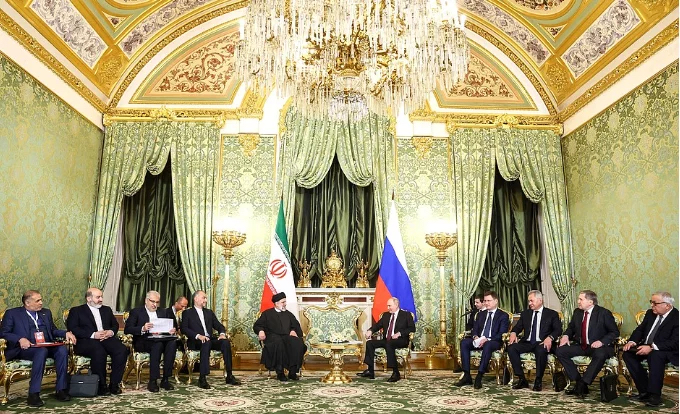
Following the personal meeting of the presidents, Putin and Raisi made public statements at this session of what the Kremlin has called the “narrow format”. The Kremlin communiqué names the Russian four on the right of the picture: right to left, Deputy Prime Minister and Co-Chairman of the Russian-Iranian Commission on Trade and Economic Cooperation Alexander Novak, a former Russian oil minister; Defense Minister Sergei Shoigu; presidential assistant for foreign affairs, Yury Ushakov; and Deputy Foreign Minister Sergei Vershinin. The Kremlin refuses to identify the four Iranian officials on the left. Iranian sources say they are, left to right: Iran’s Ambassador to Russia, Kazem Jalali; Mohammad Jamshidi, head of foreign affairs in the presidential office; Javad Owji , Oil Minister; and Hossein Amir Abdollahian, Foreign Minister.
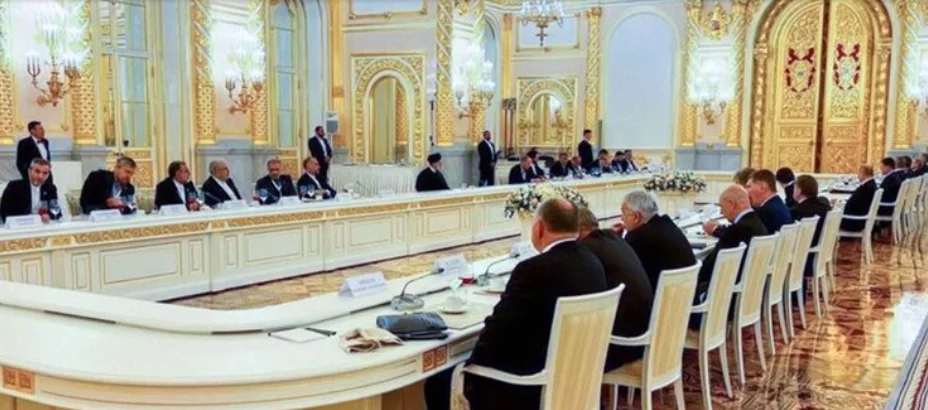
In the Iranian official news agency report, the third session of the talks involved expanded delegations. “The gathering was attended by Iranian Foreign Minister Hossein Amir Abdollahian, minister of roads and urban development [Mehrdad Bazrpash] oil minister [Javad Owji], head of the Atomic Energy Organization of Iran [Mohammad Eslami], the governor of the Central Bank of Iran [Mohammad-Reza Farzin], and their Russian counterparts. The two sides discussed a range of bilateral issues in the meeting, exchanged views on cooperation in the fields of energy, monetary and banking sector, transportation, and agriculture, and weighed plans for new initiatives to speed up the implementation of the past agreements.”
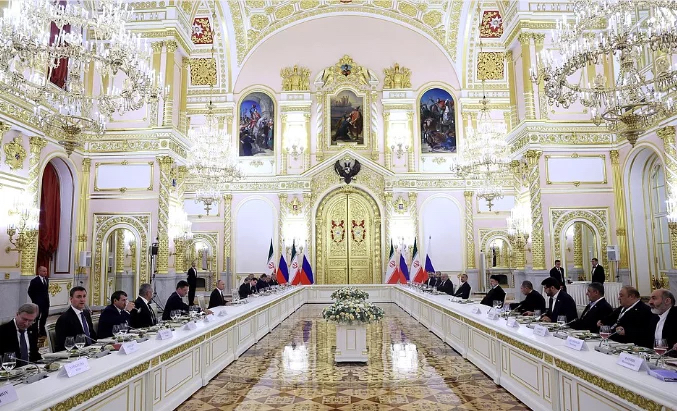
The third session was followed by a luncheon at the same table. There was no military discussion.
One outcome, if not intention, of this set-up, according to a Moscow source, was that it helped to isolate Putin as far as possible from Raisi, and prevent the two of them having intimate conversation. It’s unclear whether the one-on-one conversation with which they began, was resumed after the planned luncheon, which for timing turned out to be dinner at around 2100.
About two hours into the talks, the Islamic Republic News Agency (IRNA) published the first report and picture. This appears to shows the two presidents together in the Kremlin. In fact, the picture is from the Kremlin archive and dates from a meeting between the two presidents in Ashgabat, capital of Turkmenistan; that was on June 29, 2022. The IRNA text following the Kremlin private meeting is here.
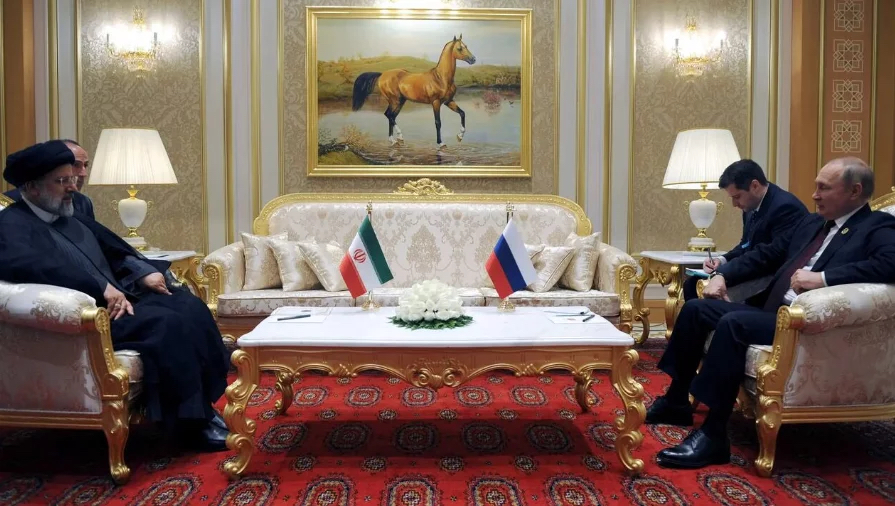
The primitive portrait of a young Arabian stallion on the wall and the new Bokhara pattern rug on the floor ought to be recognised as clues this is not a location in the Kremlin. Source: http://en.kremlin.ru/
In his public introduction, Putin told Raisi: “Yesterday, you know, I was in a neighbouring region, I flew over the territory of your country and I wanted to land and meet in Tehran, but they told me that the President had already packed up and was flying to Moscow.” Raisi replied, contradicting him: “I must tell you, Mr Putin, after your visit [to Saudi Arabia], I wish you godspeed, we were ready for your plane to land at Tehran Airport, and we were ready to welcome you as well.”
The strategic significance of the meeting sequence for the Russian, Emirati, Saudi, and Iranian leaders is great, and therefore secret. The London press is reporting that MBS of Saudi Arabia had delayed his London trip so that he could meet Putin — that had been decided several days before Putin’s arrival. Putin’s schedule on Wednesday had been grueling, and the meeting time was extended beyond schedule in Riyadh. The Russians also wanted to manage the public appearances to achieve parity between the Arabs and the Iranians.
The close-up video and audio record of the opening statements show Raisi in mental command, Putin hesitant, fidgeting, and fatigued.
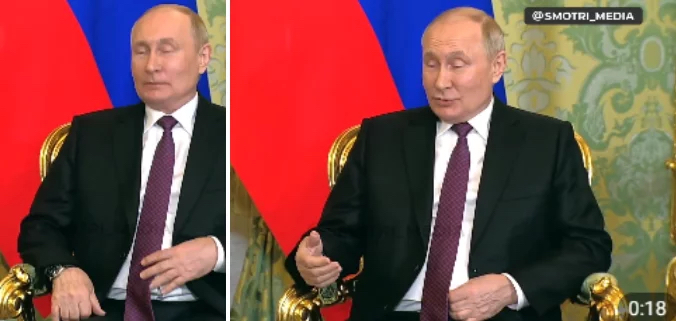
Source: https://t.me/s/rybar/ -- 19:25 Moscow time
Putin’s repetitive right-hand motion on his chair arm, his persistent voice-clearing cough, and his resort to mnemonic formulas are indicators of his uncomfortableness following the private meeting with Raisi.

Source: https://twitter.com/
Notwithstanding, Moscow sources comment, there has been a noticeable improvement in the relationship between Putin and Raisi since Raisi was given the long-table treatment on his first visit to Moscow on January 19, 2022. The opening of the Special Military Operation in the Ukraine, NATO’s escalation on the battlefield, and the accelerating military collaboration between Iranian and Russian forces have transformed Putin’s conduct.
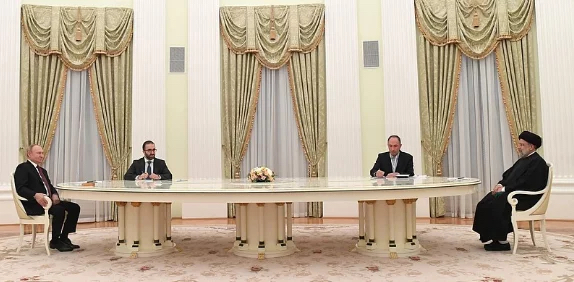
Source: http://en.kremlin.ru/
The Iranian positions were made clear ahead of Thursday’s trip to Moscow, and then immediately afterwards. Raisi’s priority, he said himself, was Gaza and breaking the Israeli blockade. “Holding talks on ways to send humanitarian aid to Palestine and help the Palestinians fulfill their legitimate rights will be among the plans during the Moscow visit, the president underlined.”
On Thursday morning, Teheran time, IRNA headlined Raisi’s objective was to get Putin to agree to a joint call for “immediate halt to Gaza bombardment”.
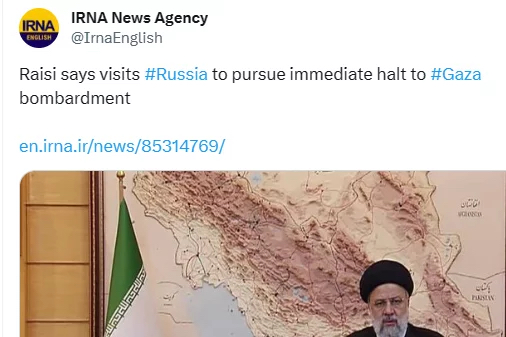
Source: https://twitter.com/
By the late evening, Raisi authorised his spokesman to issue a statement of agreement between the presidents which was significantly less. “In a 3 hour closed meeting btw Presidents Raisi & Putin, the two had a detailed and very useful negotiations on bilateral and regional issues, focusing on Gaza. Reminding successful cooperations in Levant, President Raisi proposed ideas. The two agreed to act in coordination.”
At Raisi’s right and head of delegation was the Iranian Foreign Minister Hossein Amir Abdollahian. Following the refusal of the Kremlin to identify the four, Iranian sources have revealed who they are. At the extreme left of the picture is Iran’s ambassador to Russia, Kazem Jalali. Second from left is Mohammad Jamshidi, a former professor of politics at the University of Teheran and currently deputy chief of the presidential staff for political affairs; he acts as the presidential spokesman. His comment on the talks is Raisi’s authorised version:

Source: https://twitter.com/MhmmdJamshidi
In the IRNA photograph of the Kremlin session, seated between Jamshidi and Abdollahian there was Javad Owji, Iran’s Oil Minister.
This lineup indicates there were Iranian matches for three of the Russian delegation, but not for Defense Minister Shoigu. Mohammad-Reza Gharaei Ashtiani, Brigadier General and Iran’s Defense Minister since 2021, is Shoigu’s counterpart, but he was not present in the Moscow meetings.
The Fars news agency has also announced that participating in the Iranian delegation, but not in the front row of the “narrow format” session, there were Minister of Roads and Urban Development Mehrdad Bazrpash; head of the Atomic Energy Organization of Iran, Mohammad Eslami; and the Governor of the Central Bank of Iran, Mohammad-Reza Farzin.

Left: Mohammad-Reza Ashtiani; centre, Mohammad-Reza Farzin; right, foreign ministers Abdollahian and Lavrov sign the “Declaration by the Russian Federation and the Islamic Republic of Iran on the Ways and Means to Counter, Mitigate and Redress the Adverse Impacts of Unilateral Coercive Measures” on December 5 in Moscow.
Farzin’s role, together with that of Russian Central Bank governor Elvira Nabiullina, is to devise counter-measures for US and European sanctions, and to implement “a road map [to] be drawn up by States to reduce the dependency of international trade on national currencies that are prone to being used to implement unilateral coercive measures or to sustain a particular State’s monetary hegemony over the global economy.” This is one of the sixteen points of agreement which Abdollahian signed with Russian Foreign Minister Sergei Lavrov on December 5, two days before Raisi’s arrival.
Read the full economic counter warfare plan here.
Moscow analysts note that while Putin may be keeping his distance from the Iranian rhetoric against Israel, at the working group level the collaboration of the two states in military, financial and strategic operations means much more. There is also discreet evidence that the Chinese are active in the planning of a major humanitarian operation for Gaza.
“On the battlefield Russians are very fast learners from their mistakes,” a veteran Moscow analyst says. “But in Russian politics and business they are slow to accept that the US and Israel have always been enemies to Russian interests, and will remain so. What the Americans and Israelis don’t realise is that Putin was the slowest to change his mind towards them. The Ukraine war and now the Gaza War have changed all that.”


Hard to say what will come of this but it is obvious that Russia and Iran are moving closer together. Perhaps they were talking about how to ensure that this war does not widen into one where the US and/or Israel launches an attack on Iran itself. They would hardly be talking about a scenario where Russia and the US could potentially get into a shooting match over Gaza. If something like that was in the offing where there might be an attack on Iran, then perhaps it was arranged that Putin would send an air wing to Iran. You know. On a good will visit. And if that was not sufficient, perhaps the Chinese could send an air wing as well – in a reinforcement of good will.
This is such a timely and well-selected post.
The Gaza issue is going to change politics for everyone in the region, and poses a distinct political challenge for Putin, as the article demonstrates so well.
Putin has to step carefully.
A good bit of the Russian economy is in the hands of Jewish oligarchs, of course, and up to now Putin has played that fault-line masterfully. If Putin has a weakness, it’s that Russia’s economic performance is somewhat, possibly a lot dependent upon the cooperation of those Jewish oligarchs.
And that show – the maneuvering of Putin and those oligarchs – is well-hidden.
The question isn’t whether those oligarchs will be forced to align to Russia’s long term interests, the question is how disruptive that transition will be.
Those oligarchs are well aware of what’s happened to other, more intransigent oligarchs who’ve had their wings clipped.
Mikhael Khodorkovski comes to mind.
My take on Putin’s reluctance to publicly support Iran on the Gaza issue is that he’s got a lot of background work yet to do before he can take such a stance, and I posit that such background discussions are very active at this point.
I note further that the Russian military seems to recognize Israel as its enemy. But Putin has to manage the economy, not just the military. That’s why he’s so uncomfortable. He’s not quite ready to take this one on, and events are forcing the issue before the ground work’s been fully completed.
And it seems quite likely that both the U.S. and Israel are keenly aware of this fault line within Russia, and may well see Gaza as a way to disrupt Russia’s economic revitalization.
Equally important, too, is that Israel, more specifically, the Netanyahu administration, has, eh, interesting diplomatic relationships.
The nationalist wing has been skeptical about US for decades. Netanyahu, particularly, has been fostering relationship with Russia. Things have gotten complicated over past year or two, but that’s all the more reason for Russia to not make enemies of Israel.
There is a lot of diplomatic gain Russia can make by mediating, but that requires retaining a measure of trust from the Israeli side.
Bait; 7 Oct was a minor skirmish, that the US and client has blown out of all reason.
US’ UN veto!
What Iran/Russia need to do is not interfere with the enemy while they blunder into chaos.
Excellent analysis that doesn’t pretend to fill in the blanks of what we don’t and can’t know … yet. I’d suggest that the issue of Palestine not being the headline is not necessarily indicative of the importance of the issue. It’s quite possible that what we saw over the last couple of days was Putin personally leading shuttle diplomacy efforts. Given Putin’s retinue in the UAE and KSA, the discussions were serious. The incredibly fast timeline suggests that all the ground work had been laid and this trip was about finalizing something or things.
I’d suggest that hosting Iran immediately after the trip indicates that a large part of the effort was actually about Gulf-Iranian relations. Realistically, Palestine isn’t solvable without those relations in line as a predecessor. Putin the mediator but he’s got a full plate and complications with Russian-Israeli relations.
Our problem as observers is that this looks like the most serious type of diplomacy but as such is mostly behind the curtains, and it lacks that US style of being unable to shut up. The clue I’ll be keeping an eye out for is if there’s an announcement of Putin holding some sort of talks with Erdogan in the very near future. But man is heartbreaking that the Palestinians are shouldering the death and destruction while international politics plays out.
Putin held a call with Sisi today. Not confirmation but suggestive of shuttle diplomacy through Moscow.
Gaza and the Palestinians are a problem indeed. Because Israel. And while the preferred solution for Israel is ethnic cleansing or genocide (that would truly memory hole the whole issue), practically Israel is having limited options. Even War on the Rocks admits that:
https://warontherocks.com/2023/12/israels-gaza-ground-invasion-and-the-return-of-strategic-depth/
All the Palestinians have to do is live and endure, through this slaughter and several more others. Through more humiliations and sickness and famine, and thirst and deprivations and cold and heat and overall bleakness.
The US power will vane slowly, and relatively, while Middle East and Wester Asia will get stronger footing and better anchoring between themselves and Russia and China as stability pillars. The long term game is not looking good for US while Israel will have to eat a lot of crow.
http://www.crowbusters.com/recipes.html
“The war has to be economic and infrastructure suffocation [of Israel],” a Moscow source says. “Yes, that’s the only way to beat the beast.”
Let’s unpack that statement: The developing coalition of Arab/Persian Muslim states, and their allies, that surround Israel, don’t need to expend direct military force. They have only to sit tight and impose economic sanctions and boycotts. And, does ‘infrastructure’ involve pipelines and blockades of oil and LNG tankers supplying Israel? How to implement this without causing additional harm to the Palestinians would be tricky.
This one and last one by Helmer GREATLY appreciated.
This is all so deeply disturbing, enraging and sad, it is difficult to not become emotional when learning about current events. And that is just for us western observers safe from the violence, (at the moment), we can only imagine what the Palestinians are going through.
Iran and Hezbollah are in a dilemma: although arguably in a position of greater power than years ago, they risk escalation and a full-scale regional war, which would obviously not be good for anybody. We can speculate what would happen if an Israeli (and/or US/UK) “false flag” sort of event occurs and the conflict spreads. If the Persian Gulf becomes a war zone, how high will petroleum go?, the ramifications and knock-on effects for the entire global economy will be staggering, not to mention increased destruction and loss of life. At what point could the conflict turn “nuclear”?
The DT regime had Iranian Gen. Qasem Soleimani murdered in high-profile fashion, it made the news worldwide. This looked like a flagrant, well-publicized provocation and act of war. Iran reacted with relative restraint then. And now, as noted, Iran is not keen on escalating the conflict after years of crippling siege warfare (so-called sanctions).
After seeing thousands of children, women, elderly, medical professionals, journalists, university professors etc. blown into bits, and the horrific gore on a daily basis, the public opinion in West Asia must be champing at the bit to put a stop to it. They are going to bomb Gaza into the Stone Age, mass murder tens of thousands more innocents, and continue the murderous rampage and land theft in the WB.
https://thegrayzone.com/2023/12/07/tribute-refaat-alareer-teacher-murdered-israel/
Despite Scott Ritter and others claiming this is a victory for Hamas, the public opinion in the region probably does not see that. The Israelis continue their slaughter, and no one will stop it. If Iran, Hezbollah, Russia, Turkey or anyone else tries to intervene on a significant level, how likely would escalation into nuclear exchange become (Israel has nukes too).?
It looks like the US is bent on a desperate, scorched-earth, hegemony or total destruction policy. Even if the US cannot win against the global majority, it will threaten to destroy the world (a game of “chicken”).
Putin sees this, negotiating with the US is fruitless, they are not capable of agreement. The US is acting like a madman with his finger on the nuclear trigger. That, simply put, is what the world is up against.
This is important news that isn’t being reported elsewhere in the U.S.
I was very interested to see President Putin flying into Riyadh escorted by four high-tech Su-35 fighter aircraft, where he was apparently met on the tarmac by the aged King Salman himself after being greeted with a 21-gun salute in the UAE. His evident exhaustion during the meeting with President Raisi is unsurprising.
Nothing has come of any of this diplomacy, because the U.S. is immune to diplomatic pressure, as the risible reasoning for Friday’s UN Security Council veto shows. Putin himself proved this in 2022 — I remain convinced that the initial military thrust toward Kiev and Karkhov was simply a feint intended to force the negotiations that would have succeeded but for the Anglo-American veto. The Russians are fools to think that diplomacy has any relevance.
We are already in World War III. Russia is engaged in an existential military struggle while Iran has a nuclear gun pointed at its head, as their weak-tea response to the murder of Qasem Solemani showed. Modi of India seems happy that Muslims are dying. Where is Türkiye? Where is China? The only solution is the complete economic isolation of Israel, the EU, and the US by the rest of the world. In the alternative, the world must acquiesce to the ethnic cleansing of Palestine — which is a better short-term alternative than the current campaign of mass murder.
Meanwhile a child dies by American bombs in Gaza every 10 minutes.
And Israel is now saying it can “no longer accept” Hizbollah on its border.
Where exactly does that lead?
That ‘leads’ to a regional war.
Also, what is happening on the West Bank? The usual obfuscation by the western MSM is happening on that subject.
Mentioned in another comment that every time that Israel runs a war game against Hezbollah, they lose – badly. But this sounds like the hard-right in Israel think that as they are already genociding Gaza, that they may as well retake southern Lebanon and destroy Hezbollah itself. This is not good if that is the thinking.
My thoughts too.
And if things go badly “we” can nuke Iran.
I would prefer to not wake up to that scenario, better to die in my sleep.
War on the Rocks advises against that. Israel tried it and failed before.
https://warontherocks.com/2023/12/israels-gaza-ground-invasion-and-the-return-of-strategic-depth/
Perhaps Netanyahu hopes it leads to just enough brushfire conflict with Hezbollah that he can somehow say an ongoing “state of war” requires further putting off his trial and possible conviction and imprisonment.
That is at least part of what this is about from Netanyahu’s perspective.
“…complete economic isolation…”: most importantly by American middle and upper middle income classes. Voting has no effect, there will be no significant uprising, but economic withdrawal on a large scale over the long term might force change.
I wonder what, if any, significance is there that putin didn’t stop in Iran on the way home? He was tired and wanted to sleep in his own bed? Why did he visit Persian gulf in the first place? Could it be to discuss Iran’s call for an embargo? Might this be why there was no need to stop in Teheran? And if so, did he push for or against an embargo?
Somebody wondered if he’s worried about his Jewish oligarchs… I would have thought they’re suitably contained…
Sounds as if us/israel have decided to go after Hizbullah/lebanon. If so, a regional war looks likely.
I think an oil pipeline feeding israel crosses turkey. A leak would require shutting it for repairs.
Like Minister Wang Yi earlier this year, was Putin acting as Raisi’s go-between with Sheikh Mohammed bin-Zayed and Crown Prince MBS? Did Raisi come to Moscow in a sign of Persian courtly gratitude for the efforts of his Russian counterpart to enlist Iran’s recent rivals in the struggle against their common enemy? Is the Oil Weapon finally to be deployed?
Palestine is Sunni and as such requires Sunni countries to make the first moves. There’s no impetus for Russia to reveal its hand at the moment. West is eating itself over Gaza so time is on Russia’s side. Ultimately, Türkiye & Egypt will need to intervene but not before international organisations of justice and human rights are seen as Western puppets. A stab at the very heart of the ‘Rules Based Order’. Popular anger in Egypt, Jordan and Indonesia also has some way to go before things are cooked. Iran getting involved would be highly counter-productive. Putin not stopping in Tehran on way back shows the Arab league that Iran’s not on the same table. Iran was likely told in Moscow that they’re benched for this game.
Things are also heating up in the South China Sea..
No matter what happens in Gaza, Israel has already lost. Netanyahu’s determination to stay in power no matter the cost means Israel’s best & brightest will emigrate to the US. A hollowed out Israel will become an failed state creating a (another) huge economic drain on US at the very time US can’t afford it.